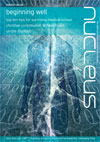In the summer of AD 386, a young man lay weeping under a fig tree in a Milanese garden. Tormented by his failure to overcome his sinfulness, he cried out to God: 'Will you be angry forever?' Suddenly he heard a child's voice, chanting. 'Take and read; take and read'. (1)
He'd brought to the garden Paul's letter to the Romans. He picked it up, opened it, and read the passage his eyes first fell on. 'Let us behave decently, as in the daytime, not in carousing and drunkenness, not in sexual immorality and debauchery, not in dissension and jealousy. Rather, clothe yourselves with the Lord Jesus Christ, and do not think about how to gratify the desires of the flesh'. (2)
Immediately he felt as though the darkness of his doubt had fled. This was the moment of his conversion; the beginning of a life for Christ that has perhaps had more impact than any other since. This young man was Augustine, perhaps the greatest of the early church fathers.
We're not Augustine. We're unlikely to have the influence he did. And I don't want to encourage randomly opening the Bible and reading whatever we see first. The point is to take, and read, God's Word. It's God's Word that will convict us and change us as we study and wrestle with it. Ask God to make it clear to you by his Spirit.
where do I start?
There are so many books and articles out there to help us do this. But where do you start? What are the key books to read that will give you a foundation?
To help you with this we have launched 'take and read'. It's an invitation to read good books. We've selected a range of readable, relevant books to help you understand the Bible better, and we want you to get your hands on them!
but I'm too busy!
But however good the books and the bargains, many of you may still be reluctant to take them and read them. Perhaps you're too busy, or perhaps you've got too many books already?
Paul wasn't too busy to read. In fact, getting hold of his books and parchments was one of his priorities. (3) Busyness is about priorities: do we want to understand God's Word more, and better apply it to in our lives? Spending ten minutes a day reading on the bus, or listening to an audio book can make a huge difference, time you might otherwise spend on Facebook or watching a Netflix box set!
So take books, and read them. And pray that God will use them to help you understand his Word and his will, to help you grow in your love of him and his people, and to equip you better to live out your discipleship as a student.
See the CMF student homepage and click 'recommended books' (4) to get started.
John Greenall is CMF National Field Director and a paediatrician in Bedfordshire
1. Augustine trans. Blaiklock EM. The confessions of Saint Augustine. London: Hodder & Stoughton, 1983, VII.xii.29
2. Romans 13:13-14
3. 2 Timothy 4:13
4. www.cmf.org.uk/students/booklist
This article was adapted from an article in Nucleus Spring 2014 by Giles Cattermole
Take & Read
Matters of Life & Death
John Wyatt CMF / IVP 2009
CMF student price £5.00
Review by Christi Brasted
Informative, insightful and personally challenging, this book will cause you to reflect on your beliefs and the reasoning behind them. It will make you question the values society has placed on life, and how that has affected current medical ethics and practice.
John Wyatt is Emeritus Professor of Ethics and Perinatology at University College London. He writes from a wealth of clinical experience and research, and discusses very complex issues in depth with the utmost sensitivity and delicacy, reflecting on biblical concepts and drawing examples from his personal experience. His approach is systematic and easy to follow. He brings a fresh perspective to the domain, combining his strong Christian values and his experience as a practising doctor. Reading this book has increased my knowledge of medical ethics and strengthened my personal convictions regarding issues such as euthanasia and embryonic stem cell research. It is without doubt a must-read for any Christian medical student and I can not recommend it enough.
Hard Questions About Health and Healing
Andrew Fergusson CMF 2005
student price £4.00
Review by Sarah Montgomery-Taylor
The book begins with the foundations of what we believe as Christians as a basis to approach issues of health and healing. It discusses the need for a balanced view of healing between the physical (that most doctors have), and the spiritual (that Christians might have), and how this gap might be bridged by the church. The issue of cure versus healing is a key topic in the book. Healing includes aspects that are physical, social, psychological and spiritual — it is, therefore, a much more holistic approach. A brief look at the issue of suffering is important in light of the tension between the promise of a future free from all suffering and the broken world we live in now. Fergusson (former CMF General Secretary and GP) writes very practically about why and how we should pray for healing, and how we can deal with the outcome — God always answers prayer, but not always in the way we want. Many personal and clinical examples help to illustrate his points, and make this an extremely engaging and insightful read.
Cure for Life
Bernard Palmer CMF 2017
£6.00 RRP (or 5 copies for £25)
Review by Rachel Owusu-Ankomah
This may be a short book but it sure packs a punch. It provides an unashamed, systematic, whistle-stop tour of what faith in Jesus is really about. A picture of Jesus builds to a spotlight moment where the reality of Jesus Christ is clearly displayed in a way that is hard to escape. It encourages the reader to stand at the crossroads and make a decision.
Seasoned with Bible verses, personal testimonies and various examples from Christian and secular culture — often with a medical slant — the reader is taken on a journey exploring who Jesus is, what he did and how we should respond. Chapters are short and accessible; any Christian jargon is explained. Common questions are addressed, such as what it means to follow Christ, the reliability of the Bible, whether Jesus really died on the cross, and how to become a Christian.
The last two chapters examine what the Christian life should look like. It provides encouragement on living like Jesus, reading the Bible, praying, meeting with other Christians, and sharing Jesus with others. This is a book to read, and then give away to those wishing to look into Christianity. I was inspired and encouraged by this book, and now have a pile of them which I have started handing out!
































